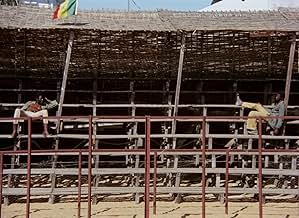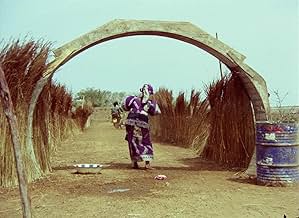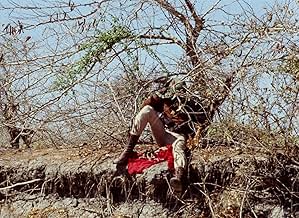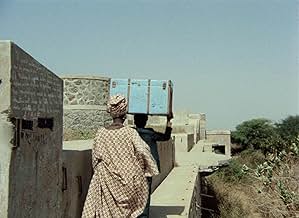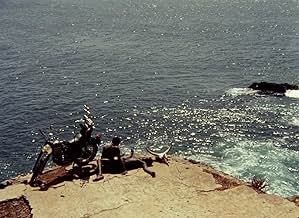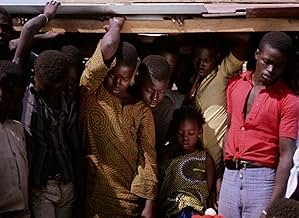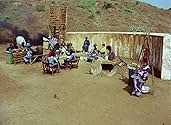AVALIAÇÃO DA IMDb
7,0/10
4,4 mil
SUA AVALIAÇÃO
Mory, um vaqueiro, e Anta, uma estudante universitária, tentam ganhar dinheiro para ir a Paris e deixar seu passado chato atrás.Mory, um vaqueiro, e Anta, uma estudante universitária, tentam ganhar dinheiro para ir a Paris e deixar seu passado chato atrás.Mory, um vaqueiro, e Anta, uma estudante universitária, tentam ganhar dinheiro para ir a Paris e deixar seu passado chato atrás.
- Direção
- Roteirista
- Artistas
- Prêmios
- 2 vitórias e 1 indicação no total
Myriam Niang
- Anta
- (as Mareme Niang)
Josephine Baker
- Joséphine Baker
- (narração)
- (as Joséphine Baker)
Avaliações em destaque
Mory, a cowherd, and Anta, a university student, try to make money in order to go to Paris and leave their boring past behind.
This film looks great and is just very interesting from the whole clash of cultures perspective. You have some African tradition here, and mixed in with that you have some Muslim practices. I am no expert, but I suspect Islam in Senegal is much different than in the Middle East. It's an interesting blend. And then, of course, you have the modern world of France, which is different from either of those cultures.
What may strike viewers the most, especially because it happens so early in the film (and is repeated later), is the slaughter of the cattle. Whether the methods shown are humane or not, I have no idea. But they look brutal, and to the modern world it may be a shock to see something that has become so far removed from our everyday life. Now, food is food, and we rarely see that once upon a time it was a living thing.
This film looks great and is just very interesting from the whole clash of cultures perspective. You have some African tradition here, and mixed in with that you have some Muslim practices. I am no expert, but I suspect Islam in Senegal is much different than in the Middle East. It's an interesting blend. And then, of course, you have the modern world of France, which is different from either of those cultures.
What may strike viewers the most, especially because it happens so early in the film (and is repeated later), is the slaughter of the cattle. Whether the methods shown are humane or not, I have no idea. But they look brutal, and to the modern world it may be a shock to see something that has become so far removed from our everyday life. Now, food is food, and we rarely see that once upon a time it was a living thing.
The first important thing to say is that I hope that no animals are ill treated or killed in the course of filming which is unacceptable and strictly forbidden. The images are powerful indeed in terms of scenes, surroundings and people's faces, bodies, expressions and behaviours. The action takes place in Senegal and the story is simple and well shown. A cow herd and a university student are longing to leave Senegal and emigrate to Paris. They try to succed in that by doing a lot of things including stealing money from other people to pay for a ship travel to France. Through it we see and are aware of the life and usages of the Sebegalese lower social class. All well filmed, directed and acted. And last but not least we listen on the background part of a Parisian song by the beautiful voice of Josephine Baker.
An African film here about youth, about the thirst to escape from a place that parches it and the bike ride through dirt roads out to sea where a ship sails for Europe. But I want to avoid merely a museum visit or an aesthetic token from a faraway place, I want the heart that pounds behind appearances and gives rise to their breeze of color. What heart here?
First are the things he says about the home that is left behind. Symbolic cows being led to slaughter and cut to the young lead riding his motorbike with cow horns on the wheel. A stolen chest, supposedly full of money to pay for a DeGaulle statue but it contains a corpse.
These are the things the filmmaker knows exactly what he wants to say about. They're also the least interesting to watch for me. The young lead being wrestled by leftist students is intercut with cows being wrestled before the slaughter. The dear bike stolen by a savage white man and left broken while he's extracted with merely a broken leg. Not without nuance, but some of it is as didactic as we make fun of Hollywood.
More tantalizing is the journey through these to outrun them, even more so once you realize this is the same journey the filmmaker himself made from that same port. A yearning for freedom, but the desired freedom is a life of material comforts in Europe, what every boy his age would dream about, cafés and girls. Meanwhile the girl meekly tugs along behind her childish man. There's a sense that she quietly yearns for more; but she also feels beautiful in the (stolen) pink suit and red hat, as any girl would. I like films where youth is embraced with its dreams and folly, this is one.
But also a deeper heart, things which the filmmaker doesn't know how to express clearly but vaguely feels stirring. There are a few of these where the surface of the film is rippled by some hidden vortix that seems to rage in the deep, like when the girl thinks he has drowned. If the journey is Godard, this is Pasolini. This might be part of what some reviews note as sloppy technique. True. This is a man still trying to fathom how images can surround a feel.
So this is it here, a journey where as these two lovers flee, they get caught up in situations that tear from them images of who they are and what their surrounding world is like, images the air takes along which become the film. In the end one self is left behind, the one who has not outrun this world.
First are the things he says about the home that is left behind. Symbolic cows being led to slaughter and cut to the young lead riding his motorbike with cow horns on the wheel. A stolen chest, supposedly full of money to pay for a DeGaulle statue but it contains a corpse.
These are the things the filmmaker knows exactly what he wants to say about. They're also the least interesting to watch for me. The young lead being wrestled by leftist students is intercut with cows being wrestled before the slaughter. The dear bike stolen by a savage white man and left broken while he's extracted with merely a broken leg. Not without nuance, but some of it is as didactic as we make fun of Hollywood.
More tantalizing is the journey through these to outrun them, even more so once you realize this is the same journey the filmmaker himself made from that same port. A yearning for freedom, but the desired freedom is a life of material comforts in Europe, what every boy his age would dream about, cafés and girls. Meanwhile the girl meekly tugs along behind her childish man. There's a sense that she quietly yearns for more; but she also feels beautiful in the (stolen) pink suit and red hat, as any girl would. I like films where youth is embraced with its dreams and folly, this is one.
But also a deeper heart, things which the filmmaker doesn't know how to express clearly but vaguely feels stirring. There are a few of these where the surface of the film is rippled by some hidden vortix that seems to rage in the deep, like when the girl thinks he has drowned. If the journey is Godard, this is Pasolini. This might be part of what some reviews note as sloppy technique. True. This is a man still trying to fathom how images can surround a feel.
So this is it here, a journey where as these two lovers flee, they get caught up in situations that tear from them images of who they are and what their surrounding world is like, images the air takes along which become the film. In the end one self is left behind, the one who has not outrun this world.
I recently showed this film to a group of students so what follows is a condensed version of the worksheet I gave them. The questions I give hopefully can assist others in making meaning from the film.
Touki Bouki can best be made sense of in the following way: It operates through allusion and symbolism. Through the story of two young lovers, Mory and Fanta, clashing with the older generation, yearning to leave for Paris, Mambety puts on screen his vision of a country where the weight of thousands of years of tradition collides head on with the modernity of a newly emergent Senegal.
Allusion...an implied or indirect reference hinting at something
Symbol...something that stands for something else...something concrete that represents or suggests another thing that cannot in itself be represented or visualised...for example a lion symbolises courage
Think about what you have seen (and heard!) in the film, paying special attention to:
Mory's motorbike – what is it decorated with? What do those objects remind you of? Fanta ties it to a tree, in the midst of a herd of cows...is there a connection to the cows?
The long scene in the first half of the film, when there are lots of shots of the sea, then we see Mory and Fanta together on the cliffs talking about leaving for France
The transformation of the Aunt from an unsympathetic character in the first half of the film to a praise singer in the second.
Charlie's car which Mory and Fanta ride off in after robbing him is a Citroen painted in the flag of which country? How is it positioned in relation to the motorbike and the welcomers?
1. How do you think the following things are alluded to in the film?
The act of lovemaking The city of Paris The cycles of life – birth, death, birth
2. How do you think the following things are symbolised in the film?
African tradition African modernity – this film is made soon after Senegal gained independence The ties which hold us, such as family, friends, our familiar environment Colonial power The primitive
Other points to consider...
Mambety inserts documentary footage from actual events, such as the women at the well, a wrestling competition, street children and a Presidential motorcade, into a fiction film. Do these scenes have anything to do with the story? What effect do they have on you, the viewer? What's your response to them? Why might they be in the film?
Certain images and sounds are repeated in the film, such as the ocean, the crows, the cries of the taxi driver who runs away from the box then repeated by the caveman. What effect does this have? Does it 'organize' the film in any way?
Answers... Mory's motorbike symbolizes Africa, in the scene after they ve robbed Charlie, it s positioned in such a way against the Citroen that the two seem oppositional. The Citroen is a French car decorated with the US flag stars and stripes so representing both French colonialism and US imperialism. The sea is a symbol for lovemaking. The cycles of nature are implied in the scenes of cattle slaughter and goat being sacrificed. Fanta ties the motorbike up as if shes trying to hold at bay the forces of modernity, of change. is the film trying to reconcile two opposing aspects, yearning for the past and tradition while simultaneously embracing modernity, the new? Whose the weird, white looking caveman up in the tree? Its as if Mambety shoves our images of 'primitive' Africans back in faces, also in the dream sequence when Mory and Fanta sit in the car, dressed in 1930s clothes smoking, being sung praises by Aminata Fal is a parody of successful Europeans. There's so much I d love to write about this film...Paris is reduced to a notion, an idea, a fantasy, brought to life through a clichéd song by Josephine Baker. On another level I read Touki Bouki as being about how Europe positions Africa and Africa positions Europe as exotic other. I m running out of space here, loads I could write about this film, hope this is useful, ENJOY!
Touki Bouki can best be made sense of in the following way: It operates through allusion and symbolism. Through the story of two young lovers, Mory and Fanta, clashing with the older generation, yearning to leave for Paris, Mambety puts on screen his vision of a country where the weight of thousands of years of tradition collides head on with the modernity of a newly emergent Senegal.
Allusion...an implied or indirect reference hinting at something
Symbol...something that stands for something else...something concrete that represents or suggests another thing that cannot in itself be represented or visualised...for example a lion symbolises courage
Think about what you have seen (and heard!) in the film, paying special attention to:
Mory's motorbike – what is it decorated with? What do those objects remind you of? Fanta ties it to a tree, in the midst of a herd of cows...is there a connection to the cows?
The long scene in the first half of the film, when there are lots of shots of the sea, then we see Mory and Fanta together on the cliffs talking about leaving for France
The transformation of the Aunt from an unsympathetic character in the first half of the film to a praise singer in the second.
Charlie's car which Mory and Fanta ride off in after robbing him is a Citroen painted in the flag of which country? How is it positioned in relation to the motorbike and the welcomers?
1. How do you think the following things are alluded to in the film?
The act of lovemaking The city of Paris The cycles of life – birth, death, birth
2. How do you think the following things are symbolised in the film?
African tradition African modernity – this film is made soon after Senegal gained independence The ties which hold us, such as family, friends, our familiar environment Colonial power The primitive
Other points to consider...
Mambety inserts documentary footage from actual events, such as the women at the well, a wrestling competition, street children and a Presidential motorcade, into a fiction film. Do these scenes have anything to do with the story? What effect do they have on you, the viewer? What's your response to them? Why might they be in the film?
Certain images and sounds are repeated in the film, such as the ocean, the crows, the cries of the taxi driver who runs away from the box then repeated by the caveman. What effect does this have? Does it 'organize' the film in any way?
Answers... Mory's motorbike symbolizes Africa, in the scene after they ve robbed Charlie, it s positioned in such a way against the Citroen that the two seem oppositional. The Citroen is a French car decorated with the US flag stars and stripes so representing both French colonialism and US imperialism. The sea is a symbol for lovemaking. The cycles of nature are implied in the scenes of cattle slaughter and goat being sacrificed. Fanta ties the motorbike up as if shes trying to hold at bay the forces of modernity, of change. is the film trying to reconcile two opposing aspects, yearning for the past and tradition while simultaneously embracing modernity, the new? Whose the weird, white looking caveman up in the tree? Its as if Mambety shoves our images of 'primitive' Africans back in faces, also in the dream sequence when Mory and Fanta sit in the car, dressed in 1930s clothes smoking, being sung praises by Aminata Fal is a parody of successful Europeans. There's so much I d love to write about this film...Paris is reduced to a notion, an idea, a fantasy, brought to life through a clichéd song by Josephine Baker. On another level I read Touki Bouki as being about how Europe positions Africa and Africa positions Europe as exotic other. I m running out of space here, loads I could write about this film, hope this is useful, ENJOY!
Two young people attempt to escape the poverty of their native Senegal and move to Paris. They raise some funds by committing petty crimes.
Touki Bouki is a very distinctive film that's for sure. The African continent hasn't been renowned for producing a great deal of important movies but this one certainly qualifies as such. It has a pretty basic story-line but it's not a plot-driven affair at all really. In actual fact it is quite experimental in approach much of the time and seems to have been influenced by the European New Wave films quite a bit. But what gives it its edge is that within that it is very specifically Senegalese. It's not often we see much from this part of the world represented in cinema, especially not from over forty years ago and certainly rarely from actual Senegalese film-makers. It's this Senegalese colour and authenticity, combined with the bold experimental cinematic presentation that makes this one very much stand out. In truth, I don't think I fully appreciated all its nuances on first viewing and would certainly like to return to it sometime in the future. Be warned though, it does contain some pretty brutal scenes of animal slaughter which make for difficult viewing. All-in-all though, this unusual film has a great deal of character and its strong sense of location makes for fascinating viewing.
Touki Bouki is a very distinctive film that's for sure. The African continent hasn't been renowned for producing a great deal of important movies but this one certainly qualifies as such. It has a pretty basic story-line but it's not a plot-driven affair at all really. In actual fact it is quite experimental in approach much of the time and seems to have been influenced by the European New Wave films quite a bit. But what gives it its edge is that within that it is very specifically Senegalese. It's not often we see much from this part of the world represented in cinema, especially not from over forty years ago and certainly rarely from actual Senegalese film-makers. It's this Senegalese colour and authenticity, combined with the bold experimental cinematic presentation that makes this one very much stand out. In truth, I don't think I fully appreciated all its nuances on first viewing and would certainly like to return to it sometime in the future. Be warned though, it does contain some pretty brutal scenes of animal slaughter which make for difficult viewing. All-in-all though, this unusual film has a great deal of character and its strong sense of location makes for fascinating viewing.
Você sabia?
- CuriosidadesThis film is believed to be Africa's first avant-garde film, although Ó, Sol (1970) could also make this claim.
- ConexõesFeatured in Câmera da África (1983)
- Trilhas sonorasParis, Paris, Paris
(Madrid) (uncredited)
Music by Agustín Lara
Spanish lyrics by Agustín Lara
French lyrics by Georges Tabet
Performed by Josephine Baker
Principais escolhas
Faça login para avaliar e ver a lista de recomendações personalizadas
- How long is Touki Bouki?Fornecido pela Alexa
Detalhes
Bilheteria
- Faturamento bruto mundial
- US$ 180
- Tempo de duração
- 1 h 25 min(85 min)
- Mixagem de som
- Proporção
- 1.37 : 1
Contribua para esta página
Sugerir uma alteração ou adicionar conteúdo ausente

